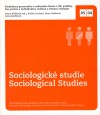The project focuses on monitoring the participation of fathers in the family and household, both during their parental leave and after they return to the labour market, with the objective of understanding the behaviour of fathers and identifying the factors that have a significant influence on the scope and extent of their participation. The project is based on a qualitative approach, which makes it possible to understand the strategies of social actors’ behaviour in given situations of life. The project will contribute to obtaining an in-depth understanding of gender roles in specific types of families and in certain phases of their family cycle and of the construction of the identity of men as fathers.
Project publications (total 22, displaying 1 - 10)
The chapter deals with the gender aspect of parenting. Data from quantitative survey (Our Society 2003) as well as from qualitative survey (fathers on parental leave) are analysed there. Even if the separate performance of parenting roles has been weaken, mothers have still been the primary caregivers.
Analyses of chances in the labour market (especially wages) in contex of no/having a child was done by the prevalent life cycle od women, e.g. by their age. The analyse of statistical data confirmes the enequalities between woman according to the period of nohaving a child and having a child and also in comparison with male population. The next part is focused to the higly qualified women and their chances and perspectives in the labour market.
The study therefore aims to answer the question of whether in families where the father is involved in caring for children in the early stage of their lives there is an erosion of gender inequalities in the family, or whether what occurs is just a modification of the given status quo.
The study therefore aims to answer the question of whether in families where the father is involved in caring for children in the early stage of their lives there is an erosion of gender inequalities in the family, or whether what occurs is just a modification of the given status quo.
The study therefore aims to answer the question of whether in families where the father is involved in caring for children in the early stage of their lives there is an erosion of gender inequalities in the family, or whether what occurs is just a modification of the given status quo.
The study therefore aims to answer the question of whether in families where the father is involved in caring for children in the early stage of their lives there is an erosion of gender inequalities in the family, or whether what occurs is just a modification of the given status quo.
The study therefore aims to answer the question of whether in families where the father is involved in caring for children in the early stage of their lives there is an erosion of gender inequalities in the family, or whether what occurs is just a modification of the given status quo.
The aim of the paper is to determine whether there is genuinely an erosion of gender inequalities in those families where fatherscontribute to child nurture in the early phases of a child´s life, or whether the status quo is merely modified. It examines whengender equality is (or can be) achieved in families and what the relationship is between gender equality in the family and genderinequality in society.
The aim of the paper is to determine whether there is genuinely an erosion of gender inequalities in those families where fathers contribute to child nurture in the early phases of a child’s life, or whether the status quo is merely modified.








Newsletter
Facebook
Twitter